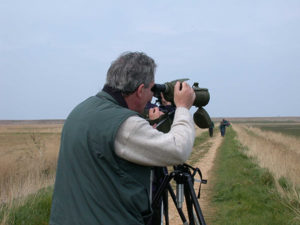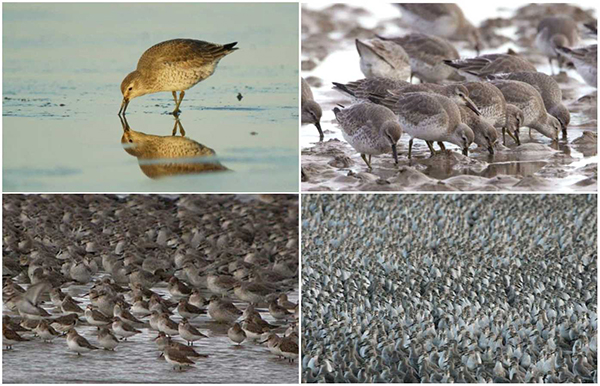BTO and RSPB research scientists are assessing the value of cultural ecosystem services provided by coastal birds, using data from our Wetland Bird Survey (a national, long-term survey where volunteers count birds on estuaries and other wetlands every month). We contribute to two parts of the CBESS project – valuation experiments and assessment of non-monetary value (through deliberative workshops).
Valuation experiments

Professor Riccardo Scarpa and PhD student Justin Grainger at Queen’s University Belfast are developing valuation experiments to evaluate people’s responses to different estuary management scenarios. BTO and RSPB are working with them by developing information on responses of coastal birds to the scenarios, and metrics to describe bird responses to participants. This will allow us to assess the value of the services that birds provide. We had a productive meeting with Justin and Riccardo in January, and are pleased with the progress they’re making. The valuation experiments will start later in 2014.
Deliberative workshops to assess the non-monetary value of ecosystem services
Dr Tim Stojanovic and colleagues at the University of St Andrews have put together deliberative workshops to engage with coastal user groups in Essex and Morecambe. The workshops assess how people use the coast, and how ecosystem services contribute to their enjoyment of it. We present questions about how bird diversity may contribute to people’s enjoyment of the coast. The first workshop took place in Essex in November and worked well, although some participants found the focus on birds frustrating. We have learnt that we need to better explain that we are using birds as one measure of biodiversity, simply because there are better data available for birds than for other taxa. We also had feedback that some of our questions were leading. We will take these lessons forward to develop our presentation for the workshop in Morecambe in May.

How BTO and RSPB hope to benefit from the CBESS project
Ecosystem services research is a relatively new area for us, so is a great opportunity to develop new collaborations (with researchers from different disciplines to our usual collaborators) and expertise in new research areas, and to use our long-term bird monitoring data in novel ways. We hope to gain an understanding of the value of the cultural services that birds provide, and the bird metrics that people respond to. Writing and contributing to peer-reviewed papers will help to maintain the profile of our scientific work (and meet our organisations’ key performance indicators!).
Unlike BTO which focuses on scientific research, RSPB science seeks to underpin its own land management (through reserves), advice to other land managers and wider land and sea-use policy. When advocating for conservation of birds and other biodiversity, and the ecosystems of which they are a part, it is becoming increasingly important to be able to understand and articulate the human benefits of our actions, alongside the intrinsic value of species. This is true of a range of the services studied in CBESS – what are the synergies and trade-offs between bird conservation aspirations and better provision of services such as carbon sequestration and storage, or storm surge protection. Gaining a better understanding of the cultural services provided by birds is absolutely crucial!
Lucy Wright and Niall Burton, BTO
Richard Bradbury, RSPB
